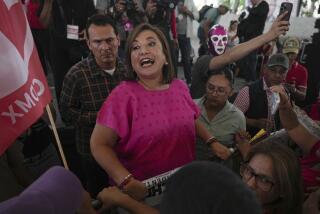Manila to Limit Poll Observers : Foreigners, Including Americans, to Be Excluded; Vote Code Cited
- Share via
MANILA — A key member of the Philippine Election Commission said Monday that foreign journalists and international observer teams, including representatives of the U.S. Congress, will be banned from the polling places during the special presidential election scheduled for Feb. 7.
Speaking to local and foreign reporters at a weekly political forum, commission member Jaime Opinion said the ban is permitted in the nation’s newly written election code, which he said provides prison terms of up to six years for any foreigners coming within 50 yards of the voting centers on election day.
Opinion, one of seven commission members, was appointed to his post by President Ferdinand E. Marcos, who is running for reelection. In an interview last week, Opinion said he views the presence of foreign observers and journalists as “outside meddling” in the internal affairs of the Philippines.
1984 Election Abuses
During the last Philippine election, a contest in May, 1984, for 183 legislative seats, foreign journalists were allowed inside the polling places, where many witnessed widespread election abuses, including ballot box stuffing and harassment of voters by local politicians belonging to Marcos’ ruling party.
“This will be a setback,” Jose Concepcion, president of a Philippine citizens watchdog group accredited as the only official observer in the upcoming poll, said today. “It throws all the outside observers out of the action.”
The Feb. 7 election is seen here and abroad as a crucial test of Marcos’ credibility, which has eroded during his 20 years of authoritarian rule, and Marcos himself invited foreign observers to the Philippines to see that the election is free, honest and fair.
Already, at least 50 separate congressional and independent groups from America are planning to visit the Philippines during the election to observe the polling, according to reports in Manila, and nearly 500 foreign journalists have been accredited to cover the event.
When asked Monday how the observers can watch the voting if they are not allowed inside the polling places, Opinion said: “President Marcos invited them to observe the elections. He did not invite them to go inside the polls.”
No Immediate Reaction
There was no immediate reaction to the election commission’s decision from the Reagan Administration, which has indicated that it, too, plans to send an observer team to monitor the election. But in a one-hour session with journalists in Manila last week, U.S. Ambassador Stephen Bosworth said the observers “can work effectively” as a deterrent to fraud “by working around the polling places.”
U.S. officials here and in Washington have made it clear that they view the honesty of the voting as paramount in the presidential poll, in which Marcos is running against Corazon Aquino, the widow of assassinated opposition leader Benigno S. Aquino Jr. The Reagan Administration believes that only a fair and honest election will restore stability in the nation’s government and economy, which was shattered in the wake of Aquino’s slaying in August, 1983.
Addressing fears about the honesty of the elections, Manila’s archbishop, Cardinal Jaime Sin, warned Monday that “machinery for cheating is in place.”
Sin, an influential figure in this predominantly Roman Catholic nation, told a meeting of the Manila Rotary Club that “the track record of the present regime in conducting honest elections leaves much to be desired. . . . We all know how the present administration rigged the series of referenda that legalized tyranny and gave the aura of respectability to the dictatorship.”
Elections in the Philippines, which became independent from the United States in 1946, are traditionally fraught with vote-buying, ballot-tampering and intimidation of voters.
Analysts here and in Washington concluded that the 1984 legislative poll was the cleanest election ever held in the Philippines, but even then dozens of election law violations were documented nationwide.
In assessing the relative success of the last election, the analysts cited the large presence of the foreign press and the role of Concepcion’s citizens group, the National Movement for Free Elections.
The National Movement for Free Elections enlisted hundreds of thousands of volunteer poll watchers on election day in 1984. The volunteers observed the voting, recorded abuses and made their own “quick count” tally, which a recent university study here concluded had preempted tampering with the election returns in many districts.
But, in the morning session Monday, Opinion left open the issue of whether the free elections movement will be authorized to make a similar quick count in the upcoming poll.
Officials of the movement were scheduled to meet with the commission today to argue their case for an independent, unofficial tally of the vote in most districts that would be available many hours before the commission’s official results.
In the interview last week, Opinion made it clear that he was opposed to such an operation by the movement, which he said was accredited by the election commission only in response to American pressure for an honest election.
But Sin, in his speech Monday, said the free elections movement is seen by the people as “the last hope of democracy.” He denounced the government’s campaign to discredit the organization.
Opinion’s announcement that foreign observers would be barred from polling places coincided with growing irritation in the pro-government press over the degree of U.S. attention to the election.
Several columnists commented on the timing of a congressional investigation into alleged multimillion-dollar property investments in the United States by Marcos, his wife Imelda, family and close friends.
One columnist, Jesus Bigornia, wrote in the Bulletin Today newspaper: “Intervention is a many-headed hydra. Applied to the Philippines, it has assumed the form of subtle threats to reduce, even cut off entirely, assistance if the wishes of the intervening power are not heeded.”
Bigornia said that the congressional inquiry was timed to embarrass Marcos.
The Daily Express carried a cartoon on its editorial page of the Statue of Liberty peering through a pair of high-powered binoculars and holding a camera with a large telephoto lens over her head. The caption read: “The Observers.”
More to Read
Sign up for Essential California
The most important California stories and recommendations in your inbox every morning.
You may occasionally receive promotional content from the Los Angeles Times.













